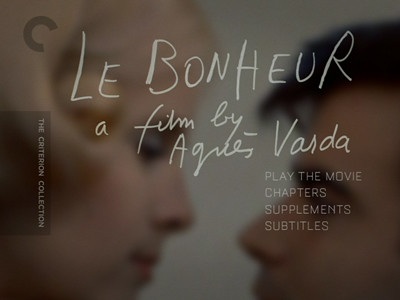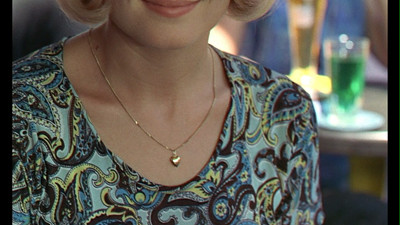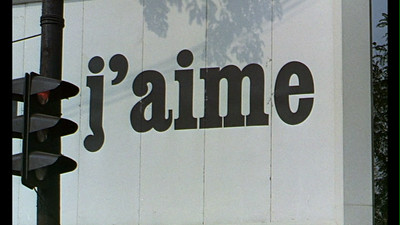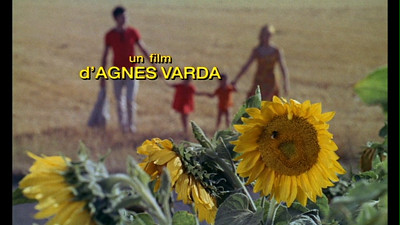
It’s funny that I ended my previous review of Agnès Varda’s Le Pointe Courte with the lines, “Happiness isn’t so easy to come by, and if it wasn’t work, it wouldn’t be worth it,” because her 1964 film Le Bonheur, which translates as “Happiness,” seemingly tells us something entirely different.
Opening on an idyllic spring day, Le Bonheur shows us a French nuclear family enjoying a picnic in the woods. Handsome papa Francois (Jean-Claude Drouot) dotes on lovely mama Therese (Claire Drouot), and they both show genuine affection for their children Gisou and Pierrot (Sandrine and Olivier Drouot). It’s a perfect scene, almost tailor-made for the movies. In fact, when they return home, Francois’ brother and his wife are watching a similar scene on TV, though even the small clip we see should be enough to suggest to us that something is not quite right. Why has Varda chosen a scene from Jean Renoir’s Le Dejeuner sur l’herbe (Picnic on the Grass) where, apparently, an older man schools a younger woman on the ways of the world? And was it by accident that the television it’s seen on appears to be practically two-dimensional? Is the world of cinema flat in comparison to our own?
Things go on pretty-good-sure-as-you’re-born for Francois and Therese. He works in carpentry with his brother, and the older sibling is looking to retire and Francois will take over. Therese stays home and sews dresses on the side, her two very well behaved children entertaining themselves in the yard. The married couple even has an active love life. From our outsider’s perspective, there is nothing amiss. Theirs is a good marriage, and they are good people.
So, why the wandering eye, Francois? When Emilie (Marie France Boyer), the pretty girl at the post office, flirts with him, Francois flirts back. Innocent enough on the first time, but the second time, it’s clear Francois was prepared to flirt before he walked through the door. He takes Emilie to coffee on her lunchbreak, they enjoy each other’s company, and they make a pseudo-date for Saturday when Francois is to come over to her apartment and fix her shelves. Francois doesn’t even have to be dishonest with her--he tells her more than once how he does not lie--and she knows he is married with kids. This guy has some game going.

Varda cunningly plays with her audience’s expectations in her set-up here. Raised on melodrama, most moviegoers will be waiting for the other shoe to drop. Francois has to cross a line somewhere, doesn’t he? He has to do something to make us hate him. Yet, he somehow manages to skirt over the thinnest of ice and come out unharmed. Even his precious honesty manages to stay intact. Sure, his speech to his co-workers about how he believes in fidelity has ironic flourishes for us, knowing what we know, but if you really listen, his definition of fidelity is such that his conscience can remain clear. He says when he loves a woman, he sticks to it, and he doesn’t act capriciously. He doesn’t say he has to limit himself to just one partner, that’s just what his friends assume.
Francois tells a similar sort-of truth to go see Emilie on that first date. He tells Therese that he has taken on a job, and though he is hoping for more, at that point in time, that’s exactly what the meeting with Emilie is supposed to be. There is further irony to be had, though, in the fact that the appointment he can’t make with Therese is to accompany her to a wedding they have been invited to. She has helped the young bride with a gown emergency in record time, and they have been asked along to see her handiwork. On the same day Therese has made another woman’s connubial bliss possible, her trust in her husband could be causing her own to shatter.

I know this all sounds terribly heavy, but what you must realize is that all through this, Le Bonheur is light and airy. Varda has made a masterwork of tone, creating neither a comedy nor a drama, but something strangely other. Her sets are full of wonderful colors, lots of pastels and warm hues, everything bright and happy. Having started her career as a photographer, the writer/director has a stunning eye for detail. She is going to pack her frame with those details and show us each and every one. A flower, a necklace, a poster on the wall--everything contributes to this portrayal of the life Francois lives as being a miraculous thing. On his coffee date with Emilie, they are flanked by store signs that say “Temptation” and “Mystery,” and he also sees a giant billboard that declares quite plainly in black-and-white, “Love.” It’s as if all of society has gotten together to make this guy as happy as he can possibly be. All darkness has been banished. Even the fades between scenes are blue, red, or an autumnal gold rather than the usual black.

It’s the filmmaker working as seducer, and while her onscreen Don Juan casts his spell on his women, so too does Varda use her filmmaking technique to capture us in that spell. When Francois explains to Emilie how he can love her and his wife and how the two need not compete, it’s clearly a selfish philosophy meant to please only him, but since Emilie swallows it without much question, we start to think that maybe this guy has his finger on something. It’s those dang details. We’re so busy soaking in them, we don’t realize that that indefinable tone of Le Bonheur is slowly slipping into dark satire.
Francois finally comes clean to Emilie on another day out at the lake. Once again, he is in a position of having to defend his choices. He told Emilie that being with her made him feel more like himself, comparing her to wildflowers while his wife is something more sturdy and reliable. Then, among the wildflowers, he tells the sturdy and reliable Therese that if this extra-marital love makes him happier, he can then turn around and make her happier. Remarkably, this seems reasonable to her, and I don’t know that it necessarily sounded reasonable to me, but I was at least impressed that once again Francois got away with it. Maybe there is something to this “European morality” after all.

Except, no, here is where Varda unveils a shocking development. Francois’ selfishness does have its consequences. After telling Therese that being untrue makes the truth all the more clear, the couple makes love and, predictably, the man falls asleep, right there under the tree, the solid alternative to the fragile and finite flower. The children wake before Francois does, and they want to know where mommy is. She has disappeared!
I knew right away what had happened. For all her toying with our expectations, there are certain things that Varda can’t mess with, we know it in our bones. There have probably been whole books written on the Ophelia motif in art and literature. There is even this one

Le Bonheur is probably too early to be seen as a critique of the free-love generation, but Varda is definitely questioning what it means to be happy in a relationship in a modern media-savvy world. Francois has a very traditional life, and he wants for nothing. He has no desire to leave Therese and the kids, he’s content. (How weird, too, that this apparently was a real-life family cast in the film!) He also loves Emilie. He’s living by the “if it feels good, do it” credo. By being part of that traditional model, Therese is forced to represent traditional values. She’ll do anything to make her husband happy, including allowing him to have another lover. Her choice to throw herself in the river is motivated by reasons only known for sure to her, but there are many lines of debate. I would probably lean away from it being that she can’t be happy and make him happy at the same time and so chooses suicide rather than share him--though there is plenty of literary evidence to suggest that women choose water as their exit because for them life is overwhelming, suffocating, and, when you’ve gone under, inescapable. (The best cinematic example of this has to be Julianne Moore’s bedridden flood in The Hours
Remember that line I was waiting for Francois to cross? Well, here he crossed it. Now is the time to start hating him. He spends the summer mourning the loss of his wife, but by fall, he’s ready to move on. Though he did indulge in a gruesome daydream where he saw Therese flailing to escape the water, even that is just to assuage any guilt. Of course he’d imagine her as not wanting to die! Seeing no reason to give up Emilie, he instead swallows her whole, promoting her to wife and mother. The flower that was once praised for growing free is now plucked and replanted where Francois can always admire it. The film ends where it began, once more out in the sunny climes of nature, the man and his new wife wearing matching sweaters, a slightly burnt yellow that mimics the changing flora. They have become their own advertisement. Life goes on when you’re happy.
I can’t help but wonder about Emilie, though. One thing she said keeps ringing in my head. When she first sees Francois after Therese’s death, she tells him, “I am happy and I am unhappy.” It’s a fairly honest statement. She can’t be pleased that a woman is dead even if it does mean it clears the way for her to be with Francois. These are famous last words if ever I heard them. When Francois makes his pitch for their new life, Emilie agrees in word, but her face and body language aren’t 100% behind the capitulation. She’s only doing what she has to do to be with the man she loves, and though making him happy makes her happy, it’s always going to be at the expense of her own full and complete bliss.


No comments:
Post a Comment